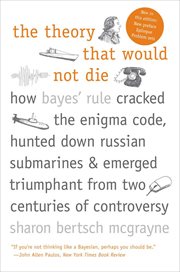Nonfiction
eBook
Details
PUBLISHED
Made available through hoopla
DESCRIPTION
1 online resource
ISBN/ISSN
LANGUAGE
NOTES
Bayes' rule appears to be a straightforward, one-line theorem: by updating our initial beliefs with objective new information, we get a new and improved belief. To its adherents, it is an elegant statement about learning from experience. To its opponents, it is subjectivity run amok. In the first-ever account of Bayes' rule for general readers, Sharon Bertsch McGrayne explores this controversial theorem and the generations-long human drama surrounding it. McGrayne traces the rule's discovery by an 18th century amateur mathematician through its development by French scientist Pierre Simon Laplace. She reveals why respected statisticians rendered it professionally taboo for 150 years-while practitioners relied on it to solve crises involving great uncertainty and scanty information, such as Alan Turing's work breaking Germany's Enigma code during World War II. McGrayne also explains how the advent of computer technology in the 1980s proved to be a game-changer. Today, Bayes' rule is used everywhere from DNA de-coding to Homeland Security. Drawing on primary source material and interviews with statisticians and other scientists, The Theory That Would Not Die is the riveting account of how a seemingly simple theorem ignited one of the greatest controversies of all time
Mode of access: World Wide Web







